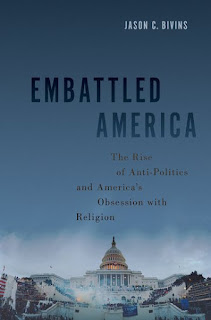 He has written widely for popular and academic media, has taught for The Great Courses, and has recorded multiple albums of improvised music on guitar.
He has written widely for popular and academic media, has taught for The Great Courses, and has recorded multiple albums of improvised music on guitar.
Bivins applied the "Page 99 Test" to his new book, Embattled America: The Rise of Anti-Politics and America's Obsession with Religion, and reported the following:
Page 99 is very close to the end of a discussion of former Vice Presidential candidate Sarah Palin. In particular, this section surveys the oft-alarmed reactions – before and after the 2008 Presidential campaign – to Palin’s identity as a Pentecostal. Equally dismissive and panicked, critics of Palin judged her politically unserious because of her beliefs, while these claims became precisely the fuel needed for Palin’s supporters to avow that they, and not godless liberals, were the true Americans. The page (and the section) conclude by holding that Palin’s critics miss the point by doubling down on the idea that religion is at the heart of her, and America’s, political problems. I suggest here that a better focus on what good political representation is could cut through the endless culture wars repetition that bogs us all down.Learn more about Embattled America at the Oxford University Press website.
Does the page work as a distillation of some of the book’s largest concerns? For the most part, page 99 of Embattled America turns out to be a fairly good one on which to ruminate. Dropping the needle without any setup or definitions can only ever capture so much, but what is clearly on display is the contrast between two different – and, I argue, similarly unproductive – kinds of public speech about political religion in America. Palin here stands in for a larger story about American life since the 1960s, where an endless reassessment of the resurgence of conservative Christianity begun in the 1970s has accompanied a steady deterioration of American democracy.
Palin is one of many conservative politicians who have employed strident religious speech to push Republican politics very far to the right since the 1990s. At all turns these politicians have been met with furious criticism, captured here on page 99 in all of its strident smugness. Yet in making this very critique – mockery of religion, warnings of witch trials – these critics play exactly the role politicians like Palin want them to: they don the mantle of the irreligious left that has been the most reliable conservative bugaboo since Jerry Falwell’s “I Love America” rallies.
More importantly, the heart of the book’s concern – that we should change the subject from bellyaching about conservative religion, which plays into the script, to key normative and institutional reassessments – is here on display. I begin to make the case that Palin’s version of political representation – inflexible mimesis of values, willingness to fight against one’s political others, social media vapidities – is deeply antithetical to what a pluralistic democracy requires.
This follows the general strategy of the book, which assesses the recent weakening of American democracy in light of regular scandals and obsessions over religion. By locating in these episodes a range of neglected political norms, my hope is to direct readers’ attention away from the sensationalism of religion and towards the reinvention of the political.
--Marshal Zeringue



